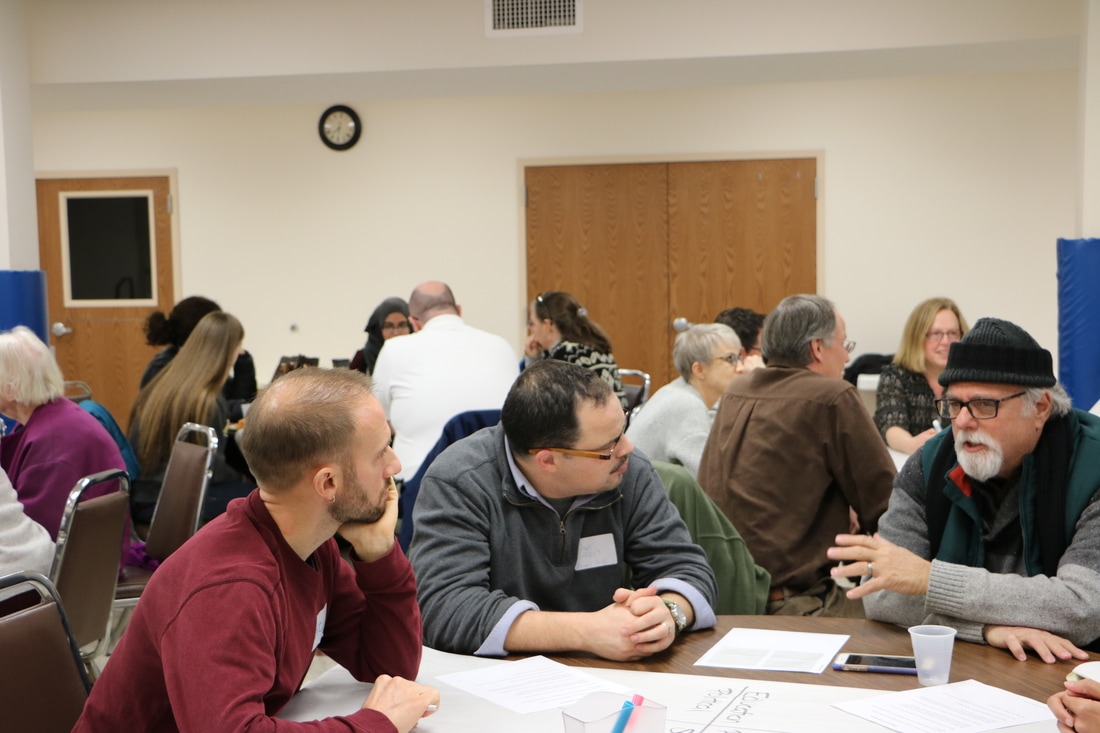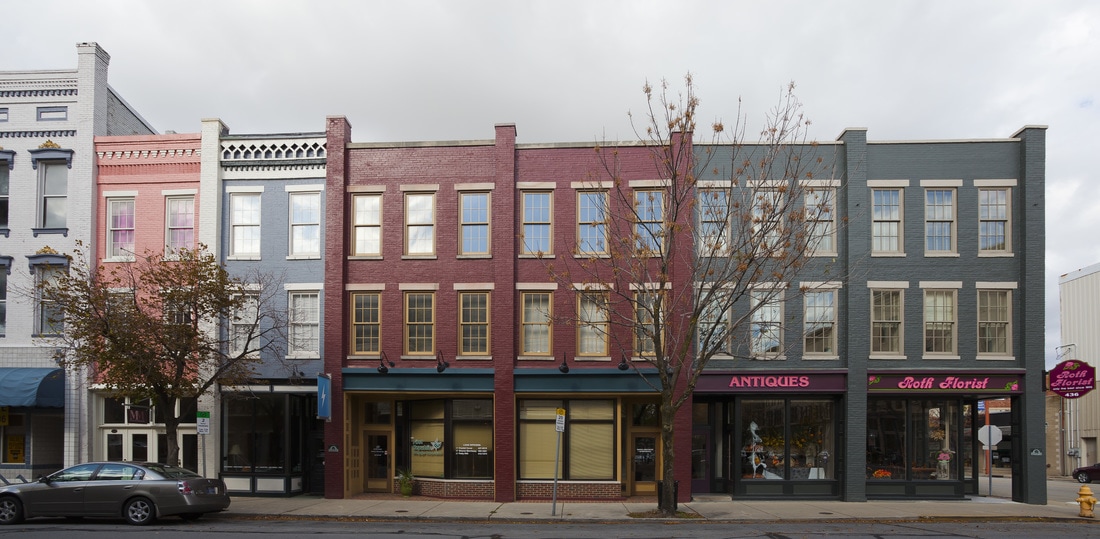|
On February 2, twenty-seven local religious leaders met in Trinity’s Fellowship Hall to talk about ways that we can build stronger relationships between faith communities in greater Lafayette. Ruth and Marc Smith called the meeting in response to the executive order on immigration and the ways that this policy and the general political climate are having day-to-day impacts on our Muslim neighbors.
The executive order on immigration, particularly the halt in refugee resettlement, counters beliefs that many of us hold. A United Methodist bishop from Minneapolis, like many other community and faith leaders, released a statement condemning the order. He wrote: The biblical witness is clear and unambiguous. Walls are unbiblical. Hospitality is biblical. Denying one’s neighbor is unbiblical. Welcoming the stranger is biblical. It is not surprising that Judaism, Christianity and Islam teach the reign of God as a banquet to which all peoples are invited. We are to welcome the sojourner, love our neighbor and stand with the most vulnerable among us. These very values from our sacred texts and faith traditions are currently reflected in the mandate of the U.S. Refugee Admissions Program and must not be usurped by any executive order. His statement goes on. But how can we, as individuals, welcome strangers at a national level, if we are not equipped to welcome them at a local, daily one? We challenge our faith communities to strategize ways to welcome the sojourner, love our neighbors, and stand with the most vulnerable among us, here, in greater Lafayette. Today, it is our Muslim neighbors that need our support. Tomorrow, it may be someone else. At the meeting, two local Muslim Americans shared remarks about how current policies are affecting Muslims locally and about local and national interfaith initiatives to start our conversation about ways to build better relationships between our faith communities through education, relationship, service, and political endeavors. The meeting was not a political response, rather the focus of the conversation was on ways to strengthen interfaith relationships and create short- and long-term local initiatives. From these conversations groups began meeting to organize:
Many other ideas for ways to engage in educational, relational, and service-oriented activities were generated. Less so were LOCAL political responses. Therefore, we plan to host a series of meetings focused on educating religious leaders on issues pertaining to immigration and refugee resettlement and the current state of our local community with regards to immigrants and refugees so that we can engage in a well-informed, critical conversation about what kind of community we, as faith organizations want to promote. One of the questions raised was how to respond when we hear disparaging remarks about Muslims, immigrants, and refugees. For example, if someone makes a comment suggesting all Muslims are supportive of ISIS, point out that no one has suffered more from ISIS than Muslims both because ISIS has killed more Muslims than any other group and because ISIS’ claim to represent Islam fuels negative attitudes and aggressive behaviors towards Muslims around the world, including here in greater Lafayette. Point out the stereotype and bring the conversation back to local concerns. Islam is not a foreign religion, it is a minority religious community in America. We have a diverse Muslim community in greater Lafayette, and many opportunities to get to know our Muslim neighbors. Take advantage of local programs such as Islam 101 or Muslim Neighbors, contact the Islamic Center to visit, or join an interfaith discussion group. Meet a Muslim, find out how the current climate has affected them, learn about how they are engaged in the community, and most importantly, recognize them as neighbors. If you are interested in getting involved in any of these activities, please contact Ruth Smith ([email protected]) for more information and to get connected.
0 Comments
The April, 2016 issue of The Messenger included a Ministry Action Plan for Trinity. With an accepted offer on the Education Building and an anticipated closing this spring, now is a good time to evaluate where we are in relation to that plan. In January of 2014, Rev. Dr. Dan Bonner, a church growth consultant from the Center for Urban Congregational Development, delivered his report with recommendations for Trinity’s future. His consulting process included many conversations (“interviews”) with Trinity’s members and constituents. Through those interviews, Rev. Bonner heard concern from our members regarding the upkeep of our facilities and our financial needs. Also, though impressed with Trinity’s long-time support of Missions, he was concerned that our congregation did not have an effective strategy to build relationships within the neighborhood. Bonner wrote: “we did not observe or hear described any strongly held value or strategy in place for ‘going’ to strengthen your congregation’s ties with your neighbors.” Through the report and dialogue with church leadership, Rev. Bonner recommended exploring ways to utilize our Education Building to address these concerns. He recommended we initiate a partnership with another local ministry partner that could promote community relationships and address the financial burden of the Education Building. That recommendation was the impetus for our conversation and negotiations with Head Start through last spring and summer. However, over time it became apparent that such a partnership would require significant financial commitment from Trinity (financial expenditures to make improvements and modifications to the building required to meet Head Start standards) thereby increasing, rather than decreasing, financial stress. Following up with a couple of additional not-for-profits yielded (although much more quickly) a similar response. Therefore Trustees recommended, and a Church Conference approved, the sale of the Education Building. It seems likely that the sale proceeds could pay off Trinity’s loan and provide much firmer financial footing. But that does not address the additional concern Dr. Bonner identified; that we need to find effective ways to reach out into our community and build relationships. So, toward that end, a “Dream Team” met last fall to brainstorm some potential initiatives to grow our involvement with our community. At a Community Dream Day, held after worship on Feb. 12, the following ideas were further discussed and developed:
In order for these outreach initiatives to be successful and to truly grow relationships, many volunteers will be needed. Some will need to have specific skills. In other cases, volunteer responsibilities will be easy and simple. We are currently in the process of identifying the volunteer needs, skills and tasks. So watch for more information about this in the future. COMMUNITY DREAM DAY RESULTS
|
What's New at TrinityKeep up to date on the happenings at Trinity Categories
All
Archives
November 2020
|
Trinity United Methodist Church
Growing in love and service through relationships with God and community
|
Connect with Us:
|
|


 RSS Feed
RSS Feed





